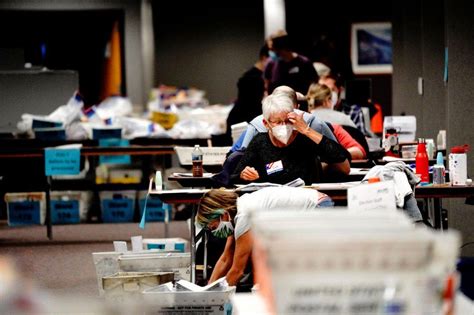Brown County clerk Sandy Juno says private money displaced career election experts, may have violated state law.
By Daniel Payne
he now-retired elections clerk in a key Wisconsin county says political activists working for a group funded by Mark Zuckerberg money seized control of the November elections in Green Bay and other cities, sidelining career experts and making last-minute changes that may have violated state law.
“They had no business doing that,” ex-Brown County Clerk Sandy Juno told Just the News, recounting how funding from the Zuckerberg-backed Center for Tech and Civic Life injected chaos and unnecessary changes to how ballots were counted in Green Bay in November.
Juno, a Republican who helped administer her county’s elections for 22 years, also called on policymakers to ban future grant money going from rich donors to local election referees because of the potential for corrupt influence.
“We need to be really on top of this, because if this is how elections are going to go, we won’t have election integrity,” Juno warned.
Juno told Just the News editor-in-chief John Solomon on Tuesday night’s “Securing our Elections: Protecting Your Vote” special on Real America’s Voicethat election management in Green Bay was turned on its head last year after a massive infusion of cash from CTCL.
The group poured millions of dollars into multiple key Wisconsin Democratic strongholds in the months leading up to last year’s presidential race, ostensibly in an effort to shore up voting systems and infrastructure amid the SARS-Cov-2 pandemic. The organization was ultimately funded with more than a third of a billion dollars by Zuckerberg and his wife Priscilla Chan; that money was funneled to additional election funding efforts across the country.
Juno claimed that following the infusion of the CTCL cash into Green Bay “the mayor’s office and chief of staff began to take over election functions.”
“And that is not something under state statutes they have the authority to do,” she said, “because under Wisconsin law, municipal clerks, the county clerk and the Wisconsin Elections Commission are the individuals charged with running elections.”
Juno said the COVID-19 pandemic had already thrown the year into chaos prior to CTCL’s involvement in Wisconsin’s elections.
“As we got closer to the November election,” she said, “we found out that this outside group had come in and was basically trying to redo our forms and documents that we use statewide. And these people were from out of state and had no business doing that.”
“So they were beginning to get involved with things that they didn’t have the expertise,” she continued. “They were working primarily with our five major Democratic base cities. So they were breaking the consistency of documents and processes and procedures used statewide.”
Neither CTCL nor the Green Bay mayor’s office immediately responded to requests for comment on Tuesday evening. Emails revealed earlier this year showed efforts by CTCL and other groups to, in part, redesign ballot instructions and other election documents in multiple cities around the state, including Green Bay.
Juno said the state normally has a clear procedure by which such alterations are made.
“As clerks, we meet with our state elections commission at least three times a year,” she told Solomon, “and [we] have continuous and ongoing correspondence with them, so that, you know, the whole state is conducting the elections in harmony.
“When you have an outside group coming in, and all of a sudden trying to dictate how to run an election — and these people were all from out of state. They had no expertise in Wisconsin, for our processes and procedures for conducting an election.”
Juno argued that the management “had an impact on the overall election,” and that the process itself was “very closely monitored by individuals who are normally not running elections.”
Private money “should stay out of the system,” she said.
“You know, the thing that happened with CTCL is with those agreements, if those municipalities did not follow what was in those grant agreements, they had the authority to claw back those dollars,” she explained, arguing that it would have been different had the cities “been given money and had the authority to use it how they saw fit.”
“But that was not the case,” she said. “They had to use it how CTCL saw fit.”

